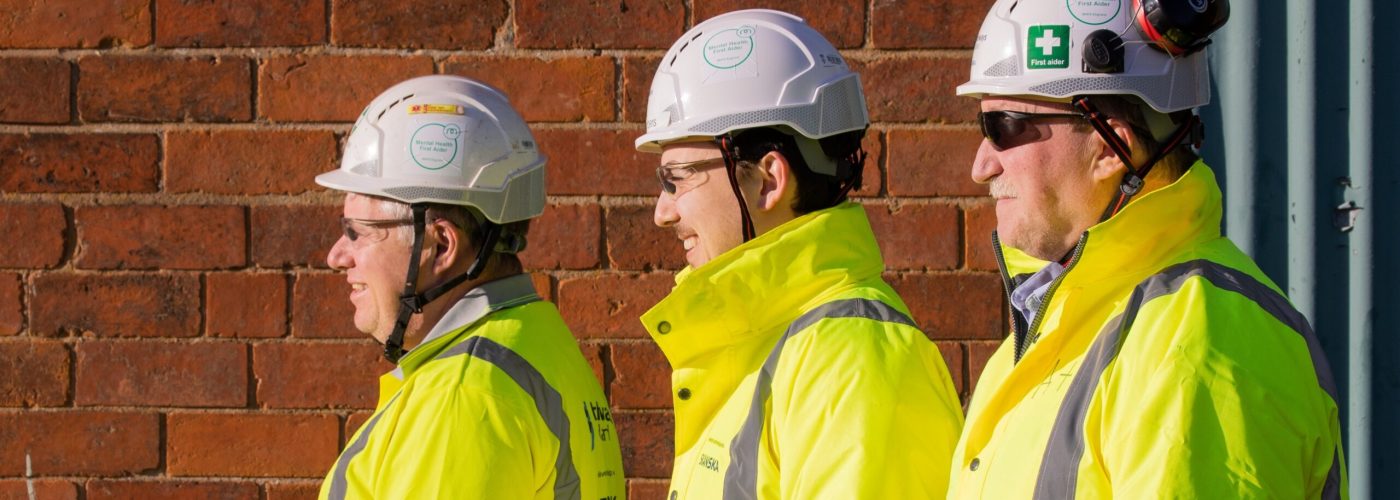Skanska, one of the world’s leading project development and construction groups, is launching a new initiative to make its Mental Health First Aiders more visible. All employees from its infrastructure business who have undertaken Mental Health First Aid (MHFA) England’s Mental Health First Aid course, will now be able to display a Mental Health First Aider sticker on their construction hard hat.
Skanska has been working with MHFA England since 2016, when it began a campaign to place greater focus on mental health and wellbeing. It wanted to remove the stigma attached to mental ill health. In February of that year, it became one of the first construction companies to sign the ‘Time to Change’ pledge, after Skanska UK’s President and CEO, Gregor Craig, had been inspired to act by his personal experiences of mental ill health.
The launch of this simple signposting initiative is a further indication of Skanska’s commitment to putting its people at the heart of the business. Through its sector leading mental health and wellbeing strategy, led by Tricia O’Neill, UK Head of Health Risk Management, Skanska is creating a working culture where its 3,300 UK employees feel valued, able to contribute and reach their potential.
The project has been rolled out across Skanska’s M42 Junction 6 Improvement Scheme.– a £255 million project to improve junction 6 of the M42. The scheme, delivered on behalf of National Highways, provides a comprehensive upgrade of the junction near Birmingham Airport, allowing better movement of traffic on and off the A45.
Out of the hundred or so people currently working on the project, eight are Mental Health First Aiders. From today they will proudly display their qualification sticker on their safety helmets. This means that everyone on site, no matter their role, will know who they can talk to, should they need support.
Speaking about Skanska’s wellbeing and mental health strategy and the wider challenges faced by people in the construction sector, Tricia O’Neill said,
“As a contractor, you are starting new jobs all the time and having to drop into new places and sites without a network. It’s difficult to build communities. You will often spend long periods away from your family, friends, and your GP. If you’re only there for a few months, people may not get to know you, meaning recognising if someone is struggling and offering the right support and signposting becomes more difficult.”
Acknowledging the need for training to be part of the Skanska approach, focus groups were organised to discuss introducing mental health training. Tricia was pleased with the enthusiasm, saying,
“60 people turned up, so it immediately felt like we were beginning to talk about the right things. We booked some half day courses with MHFA England, and by May 2016 we had developed our mental health network and had a real groundswell of positive opinion.”
Through MHFA England training, Skanska began to empower a network of mental health ambassadors. They gained the skills and knowledge to spot the signs of mental ill health, including stress and anxiety, and offer support and guidance to a range of wellbeing initiatives offered by Skanska. These include the employee assistance programme run by UK provider Health Assured, which offers around-the-clock support and counselling.
Since 2016, more than 55% of employees at Skanska have been trained in the MHFA England Mental Health Aware course or as Mental Health First Aiders. It has been a KPI for all line managers and executive staff to attend MHFA England training.
“My vision is to have mental health literacy across our network and cover all sites at Skanska ensuring resources are available to everyone no matter where they work,” reflected Tricia.
Ken Reid, Health, Safety and Wellbeing Manager, who is a trained Mental Health First Aider and works on the M42 highways improvement scheme said,
“Having our Mental Health First Aiders visible on site is helping to normalise conversations around mental ill health and remove the stigma surrounding it. The sticker easily identifies those who are trained and can provide support. People know who to speak to quickly, and if necessary, discreetly, so that they can get the help they need.”
Ken goes on to talk about the benefits of becoming a Mental Health First Aider,
“The last couple of years have been tough. We have noticed that more people than ever are coming forward to say they feel lonely and isolated. The training from Mental Health First Aid England has given me greater awareness of others’ emotional wellbeing. My fellow Mental Health First Aiders and I listen and offer guidance on where to get the right support. It can be as simple as offering to have a cuppa and a chat with a colleague – as the saying goes, a problem shared is a problem halved.”
Skanska UK Highways Director, Glennan Blackmore said,
“The idea of stickers, identifying Mental Health First Aiders is such a simple one but the impact for those on site could be potentially life changing. My hope is that this initiative will be adopted across the industry, helping to reduce the stigma surrounding mental ill health.”
Simon Blake, Chief Executive of MHFA England said:
“It is wonderful to see Skanska’s ongoing commitment to the mental health of its people. It’s ambition to train its staff in mental health awareness is impressive. The training will only create change if people know where to turn if they need support and feel safe and confident doing so. This initiative helps that. I love the simplicity of it and hope that it will be rolled out more widely across the sector.”
National Highways Programme Leader Anita Prashar, said,
“At National Highways we want everyone to get Home Safe and Well. This is a great initiative and we’re delighted to support it. The mental health of our colleagues is incredibly important.” Find out more about Mental Health First Aid (MHFA) England training at www.mhfaengland.org






